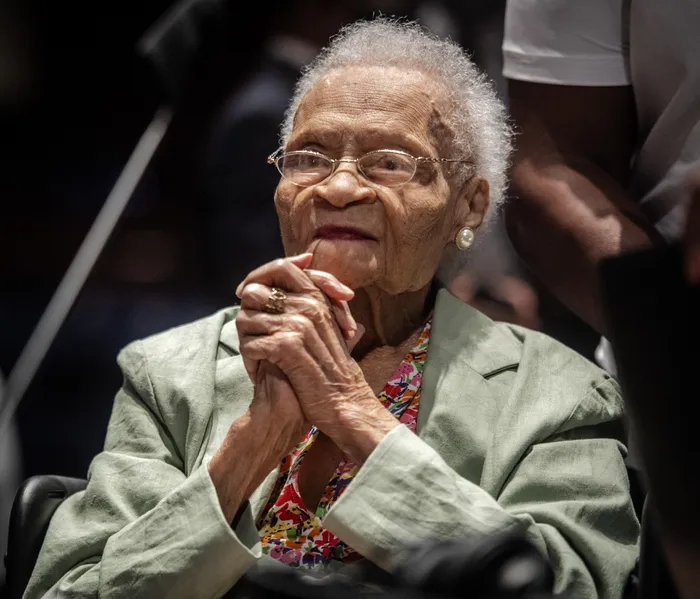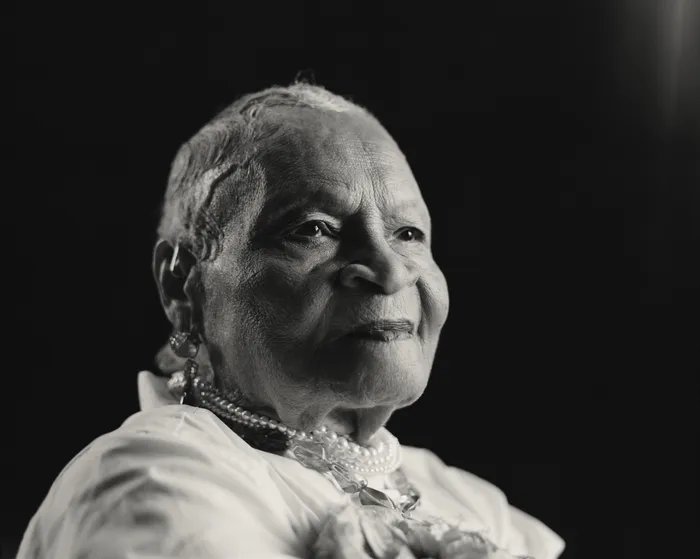Viola Fletcher, oldest survivor of the Tulsa Race Massacre, dies at 111

Viola Fletcher, one of the last known survivors of the 1921 Tulsa Race Massacre, attends a congressional hearing in 2021.
Image: Bill O'Leary/The Washington Post
Emily Langer
Viola Fletcher, one of the last two known survivors of the 1921 Tulsa Race Massacre and a plaintiff in a symbolic lawsuit seeking reparations for the attack - one of the worst episodes of racial violence in American history - has died. She was 111.
Her death was announced Monday by Tulsa Mayor Monroe Nichols, who did not share additional details. “Mother Fletcher,” as she was known, “endured more than anyone should, yet she spent her life lighting a path forward with purpose,” Nichols said in a statement.
The Tulsa Race Massacre received wide attention on its centennial, in 2021, but for decades had been largely shrouded in silence. Little of the event was known even among families of the victims, many of whom were only one generation removed from slavery and refused to speak of what they had witnessed for fear of retribution.
The rampage began the evening of May 31, 1921, when a White mob deputized and armed by law enforcement descended on Greenwood, an African American neighborhood of Tulsa known as “Black Wall Street” for its thriving economy of theaters, restaurants, hotels, doctors’ offices, legal studios and newspapers.
The ensuing violence - precipitated by tensions over the false accusation that a 19-year-old Black shoeshine worker had sexually assaulted a White female elevator operator two years his junior - lasted two days and left as many as 300 Black people dead.

Ms. Fletcher in 2023, at age 109.
Image: (Gioncarlo Valentine for The Washington Post; Wardrobe styling, hair and makeup by The Teknique Group
Hundreds more were injured and thousands lost their homes. Greenwood, once one of the most prosperous Black communities in the United States, was ransacked and torched. Some survivors recounted that firebombs made with turpentine were dropped from biplanes.
A Justice Department report released this year described the massacre as “the result not of uncontrolled mob violence, but of a coordinated, military-style attack.”
Ms. Fletcher was 7 years old at the time and decades later recalled the horrific scene she saw when her mother roused her from her sleep.
“I will never forget the violence of the White mob when we left our home,” Ms. Fletcher testified before a congressional panel in 2021. “I still see Black men being shot, Black bodies lying in the street. I still smell smoke and see fire. I still see Black businesses being burned. I still hear airplanes flying overhead. I hear the screams.
“I have lived through the massacre every day,” she continued. “Our country may forget this history, but I cannot. I will not. And other survivors do not. And our descendants do not.”
No White person was ever charged or held liable for the attack, leaving an enduring sense of injustice among survivors and descendants who - beyond the loss of life - had been robbed of their families’ homes, businesses and wealth.
In recent years, Ms. Fletcher, along with her younger brother, Hughes Van Ellis, and another survivor, Lessie Benningfield Randle, became memory keepers for the victims of the Tulsa Race Massacre - as well as plaintiffs in a legal effort to obtain a measure of compensation, however belated and insufficient, for what they had lost.
“The neighborhood I fell asleep in that night was rich, not just in terms of wealth, but in culture … and heritage. My family had a beautiful home,” Ms. Fletcher said before Congress in 2021. “I felt safe. I had everything a child could need. I had a bright future.”
“Within a few hours,” she continued, “all of that was gone.”
An earlier effort to obtain compensation for Tulsa victims and their families was mounted in 2003 by lawyers including Johnnie L. Cochran Jr. and Charles Ogletree, who filed a federal lawsuit on behalf of hundreds of survivors and descendants. Among the plaintiffs in that case was the eminent historian John Hope Franklin, whose father, Buck Colbert Franklin, survived the massacre. The lawsuit was constrained by a statute of limitations and did not move forward.
In 2021, shortly after coming forward publicly as survivors, Ms. Fletcher and her brother joined Randle as plaintiffs in a lawsuit filed the previous year to seek redress from the city and county of Tulsa, the Oklahoma National Guard, and other entities accused of contributing to the carnage and failing to protect the people of Greenwood. In the background of the case was the racial reckoning sparked by the murder of George Floyd, an unarmed Black man, by a Minneapolis police officer in 2020.
Lawyers for Ms. Fletcher, her brother and Randle filed their case under Oklahoma’s public nuisance law, arguing that the devastation of the massacre left a permanent blight on Greenwood that amounted to a public nuisance.
A Tulsa County judge ruled in 2022 that the case could go forward but then dismissed it the following year. The plaintiffs appealed to the Oklahoma Supreme Court, which ruled in 2024 that their claim was not covered by the public nuisance law.
“The continuing blight alleged within the Greenwood community born out of the Massacre implicates generational-societal inequities that can only be resolved by policymakers - not the courts,” the ruling read.
By then, Ms. Fletcher’s brother had died at age 102. Ms. Fletcher’s death leaves Randle, who celebrated her 111th birthday this month, as the only known survivor of the massacre.
“It seems that the only ‘justice’ permitted for Black Americans are sympathetic words and supposed promises that white Americans, our government, and our justice system will ‘do better,’” the two women said in a statement after the state supreme court ruling. “But the lip-service continues and tangible justice is consistently denied.”
The movement for reparations carried on, however. In June, Mayor Nichols announced a plan for a private charitable trust that would raise and disburse $105 million in reparations in the form of scholarships, business grants and investments in affordable housing and historic preservation.
Ms. Fletcher was born Viola Ford in 1914 in Comanche, a town on the prairie of southwest Oklahoma. Her family, which grew to include four sons and four daughters, ultimately settled in Tulsa, in the northeast part of the state.
After the massacre, they left Tulsa by horse-drawn buggy. “We passed piles of dead bodies heaped in the streets,” Ms. Fletcher recalled in a memoir published in 2023, “Don’t Let Them Bury My Story.” “Some of them had their eyes open, as though they were still alive, but they weren’t.”
She and her family took up an itinerant life in tents, moving from town to town as her parents sought work as sharecroppers. The children, too, worked, with Ms. Fletcher ending her education at fourth grade. She had once hoped to be a nurse.
As a teenager, she lived in Tulsa with a sister and worked at a five-and-dime store in her old neighborhood, which was unrecognizable from the place she had known as a child.
She and her husband, Robert Fletcher, were married in 1932. During World War II, they moved to California and found work in shipyards, where Ms. Fletcher was an assistant welder.
Her husband became abusive, The Washington Post reported in a profile, and after the war she returned to Oklahoma as a single mother of three. She settled in Bartlesville, north of Tulsa, where she worked as a domestic while raising her daughter and two sons. Financial necessity required her to work until she was 85.
“My family didn’t have everything we needed. We barely had enough to get by on so we could have used a lot more,” she told Time magazine in 2021. “It wasn’t probably right or good, but I managed.”
A complete list of survivors was not immediately available.
More than a century after the massacre, Ms. Fletcher told The Post that she still kept a light on at night and slept in a chair positioned toward the door of her apartment so that she could make a fast escape in the event of danger.
“I have never … seen justice. I pray that one day I will,” she said before Congress in 2021. “I have been blessed with a long life and have seen the best and the worst of this country. I think about the terror inflicted upon Black people in this country every day.”